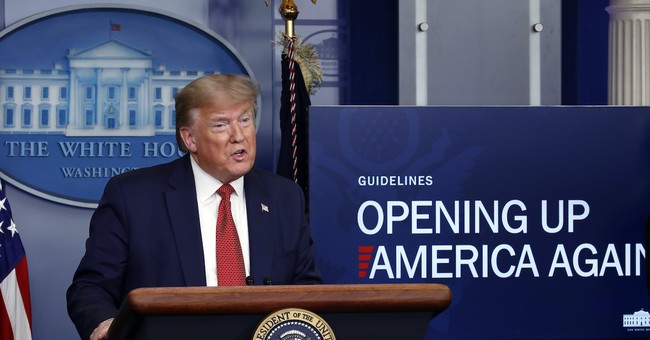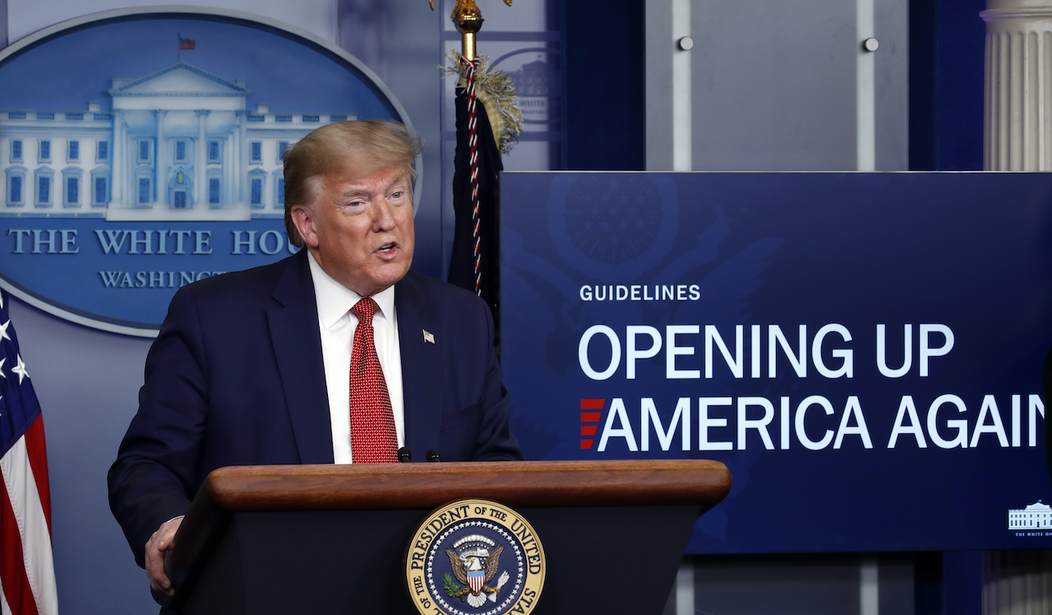
President Donald Trump speaks about the coronavirus in the James Brady Press Briefing Room of the White House, Thursday, April 16, 2020, in Washington. (AP Photo/Alex Brandon)
We’ve been covering how House Speaker Nancy Pelosi (D-CA) has been holding up the Paycheck Protection Program from being refunded in the hope that she can get more Democratic agenda items tacked on to it.
She’s been blocking the refunding for about two weeks now and the fund finally ran out of money this past Wednesday.
But it looks like there might be some light at the end of the tunnel.
President Donald Trump announced during his briefing on Sunday that they were close to a deal and it could come as early as Monday. Treasury Secretary Steve Mnuchin echoed that and said he was hopeful it could pass quickly and have the Paycheck Protection Program up again by midweek. Senate Minority Leader Chuck Schumer (D-NY) also indicated he thought they were close.
The total package reportedly involves $450 billion both for the program, for hospitals and for testing.
From ABC:
The Senate is scheduled for a pro forma session Monday, but no vote has been set.
The House announced it could meet as soon as Wednesday for a recorded vote on the pending package, according to a schedule update from Majority Leader Steny Hoyer, D-Md.
Under the emerging deal there would be $300 billion for small-business payroll program, and $50 billion would be available for small business disaster fund. Additionally, it would bring $75 billion for hospitals and $25 billion for testing, according to those involved in the talks
From the sound of the deal, it doesn’t sound like Pelosi got much of what she was looking for. Democrats had been trying to put in a lot of other money for the states and local governments which had nothing to do with the small business program.
Under the emerging deal, the government’s Paycheck Protection Program for small businesses would get roughly $300 billion, according to Mnuchin. The program has been swamped by companies applying for loans and reached its appropriations limit last Thursday after approving nearly 1.7 million loans. That left thousands of small businesses in limbo as they sought help. An additional $50 billion in the evolving deal would go for disaster loans.
About $75 billion would go to U.S. hospitals, for those straining under a ballooning coronavirus caseload as well as those struggling to stay financially afloat after suspending elective surgeries during the pandemic. About $25 billion would be added for COVID-19 testing, something states have said was urgently needed. The money for hospitals and testing were priorities sought by congressional Democrats.
But additional aid to state and local governments would be left out, Mnuchin said. Democrats have been keen to boost funding to cash-strapped states and local governments whose revenues have cratered, but the issue threatened to provoke fights between large, high-tax states like California and New York and smaller states more typically run by Republicans.
Mnuchin said he hoped the Senate might pass it today, the House tomorrow and the program could be back up on Wednesday.
Let’s hope so, people have already been left hanging long enough by the Democrats stalling. Let’s hope Pelosi doesn’t blow it up again. There was no reason not to pass the clean bill refunding the small business program two weeks ago when the GOP asked for it, that was the thing in immediate need of money.
“There’s great pain out there,” explained Suzanne Clark, president of the U.S. Chamber of Commerce. “Every hour and day that goes by without this assistance is really hurting them.”













Join the conversation as a VIP Member